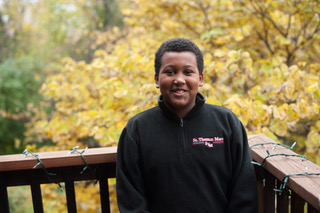Impoverished, talented boys make it to college—and more
A family weakened by addiction. A school system with a 50 percent dropout rate. A community blighted by poverty. For 11-year-old Cecil Keyes, the future looked rough.
Today he’s an alumnus of Kansas State University and a commercial real estate manager with Cushman & Wakefield. He’s also co-chair of the young professionals board for the organization that changed his life.
That organization is Boys Hope Girls Hope of Kansas City (BHGH), a McGowan Fund grantee. Part of an international network, the Kansas City organization provides academic and achievement support in a home-like setting for local boys who are gifted and motivated and who face the kinds of challenges that thwart many children, especially poverty.
According to dozens of studies, unstable housing, poor access to food, and unsafe neighborhoods all contribute to lower achievement. In fact, recent work by Stanford University’s Sean Reardon has found that the gap in reading and math test scores between children in families with low and high incomes was twice as large as the gap between white and black students.
In Kansas City, BHGH houses nine scholars, from the fifth grade to the twelfth, and surrounds them with services, including tutoring, career and college planning, counseling, and summer activities. Residential counselors live with the boys, and parents who want to be involved visit, cook meals, and sometimes lead groups. “Boys Hope gave me structure, home-wise,” Keyes recalls. “My house was kind of chaotic.”
Still, the transition for Keyes, who’s black, wasn’t easy. His new school was majority white “and a whole new beast,” he says. He faced multiple surgeries for an underdeveloped femur—he was to have 15 in all. Then one day, he had the good luck to give a tour of BHGH to a local family and found a second source of support. “I had dinner with them. They helped me with homework,” Keyes says. “They stuck with me through the surgery.”
Now he’s looking forward, aiming for a promotion, and chairing Cushman & Wakefield’s diversity inclusion committee. “It’s hard to find the words for what Boys Hope did,” he says. “There was so much.”
This 2019 grant: $35,000

